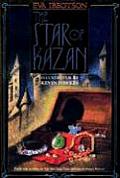 A good old fashioned fairy-tale featuring a kind-hearted orphan girl, the pair of gentle Swiss cooks who find and raise her, a trio of nutty professors, and a returning mother who may not be what she seems. Annika spends her days exploring Vienna with her friends, learning to cook exquisite dishes, and dreaming of her long-lost mother. Since she was abandoned in the Alps as a baby, Annika has imagined every possible scenario for her mother’s return. When it finally happens, she is overjoyed to find that her mother is a beautiful and rich landowner who has been desperately searching for her lost child. The only disappointment is that she must leave her dear friends, adopted family, and beloved city to join her mother in an unfamiliar, far-off home. When they arrive, some things about the new home strike Annika as very strange, but her devotion to her new mother make her ignore any misgivings. The reader will share the sense of unease, and will cheer for Annika and the mysteriously stable-boy as they uncover the mystery of what Annika’s mother is really after.
A good old fashioned fairy-tale featuring a kind-hearted orphan girl, the pair of gentle Swiss cooks who find and raise her, a trio of nutty professors, and a returning mother who may not be what she seems. Annika spends her days exploring Vienna with her friends, learning to cook exquisite dishes, and dreaming of her long-lost mother. Since she was abandoned in the Alps as a baby, Annika has imagined every possible scenario for her mother’s return. When it finally happens, she is overjoyed to find that her mother is a beautiful and rich landowner who has been desperately searching for her lost child. The only disappointment is that she must leave her dear friends, adopted family, and beloved city to join her mother in an unfamiliar, far-off home. When they arrive, some things about the new home strike Annika as very strange, but her devotion to her new mother make her ignore any misgivings. The reader will share the sense of unease, and will cheer for Annika and the mysteriously stable-boy as they uncover the mystery of what Annika’s mother is really after.
The good people of this story are dedicated and hard-working, and Annika is no exception. She is unable to understand her family’s desire to avoid hard work at all costs, and she shines when she has a difficult task to accomplish. Even when the action is taking place in her mother’s decrepit manor house in the north, Annika’s love for Vienna is central to the story, and the city is lovingly recreated in period detail and contrasted with the stark landscape of Annika’s new home. However, the story really picks up once Annika has uncovered the plot that’s at work and begins plotting her escape. While she unwinds the threads of her mother’s plan, Annika fights her way back to her home and her real family.

